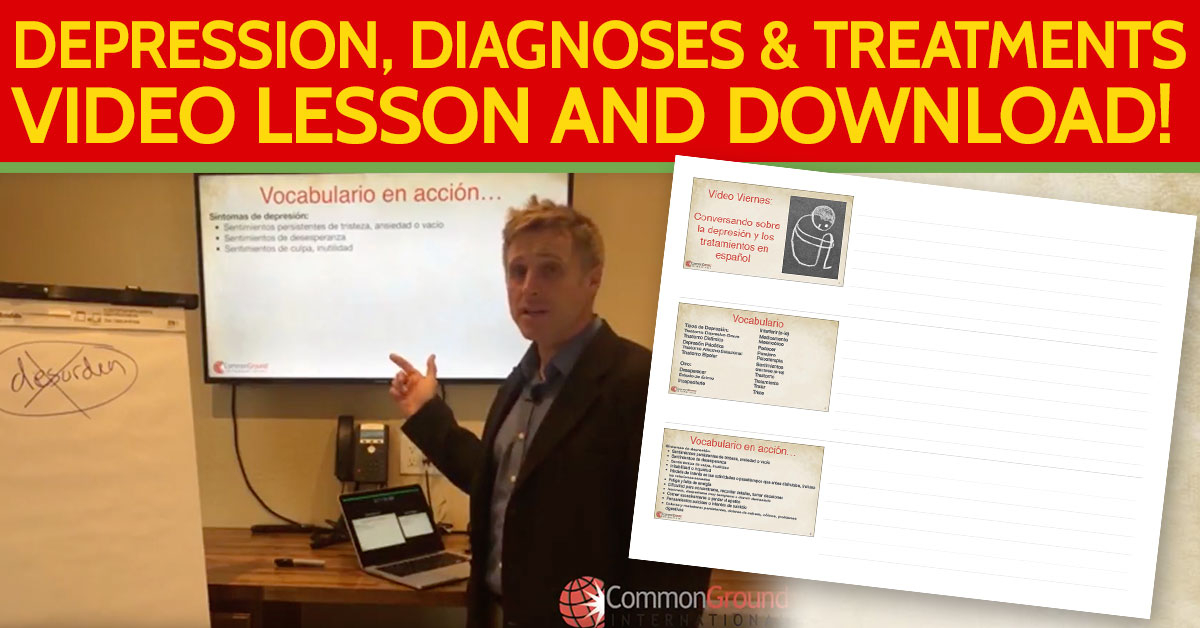In this free Medical Spanish lesson you will learn how to have Mental Health Conversations in Spanish with your patients: Conversaciones sobre salud mental.
Here is the Mental Health Conversations in Spanish lesson that I taught to the Facebook group:
Subscribe to our YouTube Channel to see all of our lessons and get the latest videos right away!
In this free Spanish Medical Lesson you will learn:
- Relevant vocabulary related to the mental health conversations
- How to express feelings using the verbs to feel and to be in Spanish
- Mental health professional names
- How to explain the depression, anxiety, panic attacks, and post-traumatic stress in Spanish
- How to talk about suicide, psychotherapy and medical treatments in Spanish
- Other related lessons about mental health conversation in Spanish
Vocabulario Relevante – Relevant Vocabulary
- Ansiedad – Anxiety
- Afrontar
– To face
- Apoyo – support
- Ataque (de pánico) – Panic Attack
- Bienestar emocional – Emotional well-being
- Depresión – Depression
- Desequilibrio
– Imbalance
- El humor – Mood
- Buen humor – Good mood
- Mal humor – Bad mood
- Estado de ánimo – Mood
- Enfermedad – Disease
- Estrés – Stress
- Miedo – Fear
- Personas de confianza – Person you trust
- Amigo(a) – Friend
- Compañero(a) – Partner
- Familiar / pariente – Relative
- Trastorno: – Disorder
- Trauma / experiencia traumática – Trauma / Traumatic Experience
Unos sentimientos con sentirse o estar – Feelings with To Feel and To Be
- ¿Se siente…? – Do you feel…?
- ¿Está…? – Are you…?
- Me siento… – I feel…
- Estoy… – I am…
Useful Vocabulary for Mental Health Conversations in Spanish
Profesionales de salud mental – Mental Health Professionals
Explicando la depresión – Explaining Depression
Es posible que tiene depresión si / It’s possible you have depression if:
Explicando la ansiedad – Explaining Anxiety

La ansiedad es un sentimiento natural. Es la reacción que su cuerpo tiene cuando siente estrés, miedo y aprensión sobre algo.
Anxiety is a natural feeling. It is the reaction that your body has when you feel stress, fear, and apprehension about something.
Cuando tiene ansiedad, siente: / When you have anxiety, you feel:
- Frecuencia cardíaca elevada
– elevated heart rate
- Respiraciones rápidas – Fast breathing
- Inquietud – Restlessness
- Dificultad para concentrar
– Difficulty concentrating
- Dificultad para dormirse – Difficulty falling asleep
Ansiedad normal es pasajera – va y viene pero no interfiere con su vida diaria.
Normal anxiety is temporary – it comes and goes but does not interfere with your daily life.
Si usted se siente ansioso la mayoría del tiempo, y le cuesta realizar sus responsabilidades diarias, es posible que tenga un trastorno de ansiedad
If you feel anxious most of the time, and it’s difficult for you to do your daily responsibilities, you may have an anxiety disorder.
Ataques de pánico – Panic Attacks
Ataques de pánico son una ansiedad muy intensa o exagerada para la situación actual. Puede ser repentino y sin explicación.
A panic attack is very intense or exaggerated anxiety for the current situation. It can be sudden and without explanation.
Explicando el estrés postraumático – Explaining Posttraumatic Stress

El estrés postraumático puede ocurrir si usted pasa por una experiencia violenta o si usted observa una experiencia violenta.
Posttraumatic stress can occur if you go through a violent experience or if you observe a violent experience.
Conversando sobre el suicidio – Talking About Suicide
Explicando la psicoterapia – Explaining the Psychotherapy

La psicoterapia también se llama terapia verbal o conversacional.
Psychotherapy is also called verbal or conversational therapy.
Su terapeuta (psicólogo, consejero) es una persona de confianza quien le ayuda eliminar (o por lo menos controlar) los síntomas para que pueda funcionar mejor y sentirse mejor.
Your therapist (psychologist, counselor) is a trusted person who helps you eliminate (or at least to control) the symptoms so that you can function better and feel better.
Explicando tratamientos – Explaining Treatments
Empatía, Normalizando y Asegurar… – Empathy, Normalizing and Assurance
Other posts in this Mental Health series:
How to Evaluate Depression in Spanish using SIG E CAPS
This Medical Spanish lesson teaches you how to evaluate depression in Spanish using SIG E…
Questions and Phrases to Assess Child Abuse and Neglect in Spanish
This Medical Spanish lesson focuses on learning how assess child abuse and neglect in Spanish….
Mental health Conversation in Spanish – Listening Comprehension
Work on your listening comprehension in Spanish and learn about the mental health situation in…
How to Teach Coping Strategies in Spanish
Coping strategies in Spanish are “Estrategias de afrontamiento”. This week, as I was preparing to…
PHQ 9 and GAD 7 for depression and anxiety screenings in Spanish
Screening for depression and anxiety with the PHQ-9 and GAD-7 in Spanish. Do you ever…
Discussing ADD and ADHD in Spanish
ADD in Spanish is “TDA: el trastorno de déficit de atención” and ADHD is “TDAH:…
Discussing PTSD in Spanish
PTSD in Spanish PTSD is lesson 4 in our 5-lesson series on discussing mental health…
Discussing Substance Abuse in Spanish
In today’s lesson, we’re addressing topic #3 from the mental health survey that our community…
Discussing Anxiety in Spanish
This is Lesson 2 of 5 in our Mental Health in Spanish series. In this…
Discussing Depression in Spanish
This is Lesson 1 of 5 in our Mental Health in Spanish series. In this…
Explaining Depression Diagnoses & Treatments in Spanish
This Medical Spanish lesson focuses on explaining the depression diagnoses and treatments in Spanish to…
Su tarea – Your Homework
- Review the notes & vocabulary
- Identify additional points and topics to discuss with patients
- Let me know if you need help 🙂
- Remember to keep it simple if you need to
- Ask for help in the comments below
- Give it a try with your patients!
Now it’s your turn! I packaged all of this vocabulary in Spanish into some flashcards for you to study.
I packaged all of this into easily downloadable .pdf notes–Get your copy for free today!
Free Medical Spanish Terminology Test
If you want to do a free Medical Spanish terminology test head over to certified Spanish, we are currently building a certification platform where you can practice this test for free. You just have to create a free user account here and start practicing your Español Médico 🙂
Keep up the good work speaking responsible Spanish to your patients! Check out our other books, classes & products to help you learn medical Spanish!
*If the link isn’t working for you, you may need to unblock pop-ups in your browser settings















Assault is agresión in Spanish
Asalto is a mugging or hold up in English.
Please make these distinctions on your materials and website.
Assault is agresión in Spanish
Asalto is a mugging or hold up.
Please make these distinctions on your materials and website.